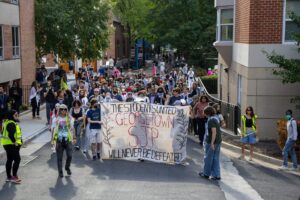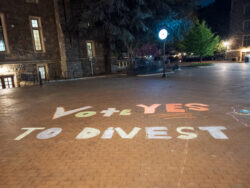Content warning: this article discusses anti-Palestinian racism, antisemitism, and genocide.
Since the Voice’s editorial board first called on Georgetown to support collective liberation and protect pro-Palestine activism, university administrators across the country have continued to do the opposite by suppressing pro-Palestine activism.
In the last two weeks, students at Columbia, Yale, and NYU have faced arrest, suspension, and eviction from university housing for peacefully protesting on their own campuses. The media’s conflation of pro-Palestine activism with antisemitism has created a false narrative about the Palestinian liberation movement, emboldening university administrators to infringe on students’ right to free speech. These smear campaigns obscure what activists are actually fighting for: an end to the genocide in Gaza and university divestment from companies with ties to Israel.
At the same time, the U.S. House Committee on Education and the Workforce has launched a probe into antisemitism on college campuses, holding two hearings with university administrators—the first on Dec. 5, 2023 and the second on April 17. Representatives have pressured administrators to indiscriminately discipline pro-Palestine protesters, and administrators have been all too willing to capitulate, violating academic freedom on their campuses.
The repression of free speech on college campuses through policing places students in physical danger. At Columbia, President Shafik’s identification of Columbia’s encampment as a threat and subsequent authorization of students’ arrest by NYPD officers puts students directly in harm’s way—especially students of color who face disproportionate threats of police violence. On campuses where police are authorized to carry firearms, students face an even greater threat of violence. Administrators have further punished student protesters by ending their meal plans, suspending them, and evicting them from on-campus housing. Threats, intimidation, and punishment for students exercising their right to free speech on their own campuses are shameful abuses of power and antithetical to the values of higher education.
By depicting pro-Palestine activism as inherently antisemitic, administrators obscure the fact that many students participating in protests are Jewish. Moreover, the false narrative that pro-Palestine activists are violent mischaracterizes the movement and ignores its calls for peace, equality, and justice in Palestine. As lawmakers continue to pass bills sending billions of dollars in unconditional military aid to Israel and universities refuse to divest their endowments from weapon manufacturers, students are standing in solidarity with the people of Gaza through advocacy.
Despite increased repression, students continue to mobilize in greater numbers than ever before. Since Columbia students established the “Gaza Solidarity Encampment” on April 17, similar protests have cropped up at universities across the country. Encampments, popularized during the Vietnam War as a form of nonviolent protest, have brought pro-Palestine student activism to the forefront of national news, widening the spotlight on university administrators’ responses.
As administrators scramble to negotiate with student organizers and suppress the wave of pro-Palestine activism sweeping their campuses, they seem more concerned with the uproar of student activism than the ongoing genocide in Gaza—which their universities’ investments are complicit in perpetuating.
While professional media has hyperfixated on pro-Palestine student activism and its fallout at U.S. institutions of higher education, students have not lost sight of the ongoing genocide. Columbia’s chapter of Students for Justice in Palestine (SJP) recently released a statement calling for all students to mobilize in solidarity with Gaza—not just with Columbia students. These student activists have made it clear that we cannot center ourselves or become caught up in political theater: our attention must stay on what’s happening in Gaza.
So what does this mean for Georgetown? All members of the Georgetown community must mobilize for an end to the genocide. The labor of activism must not fall solely on students with personal connections to Palestine. Palestinian students who have lost family members in the ongoing genocide should not have to shoulder the burden of educating their peers and organizing protests alone. Every Georgetown student should fight for an end to Israel’s genocide in Gaza through participation in the movement. Solidarity is our collective responsibility: we must support pro-Palestine activism with our active participation.
We encourage students to join campus organizations, such as SJP and Jewish Voice for Peace, in addition to making individual choices—such as supporting the Boycott, Divestment, Sanctions (BDS) movement—that contribute towards Palestinian liberation. We echo the Georgetown Divest Coalition’s demand and call on Georgetown to completely divest from Alphabet and Amazon, whose participation in Project Nimbus, a cloud-computing system used by the Israeli military, is facilitating the oppression of Palestinians. Students must pressure the university on all fronts, including by emailing administrators, posting on social media, and participating in campus protests in support of Palestine.
Students can also help crowdfund for local community members like Ibtisam and Faris, both of whom are actively trying to evacuate their families from Gaza, and educate themselves on effective organizing and Palestine’s history.
We have the privilege of living in the United States: it is our responsibility to know where our tax dollars are sent and end their use in genocide. As Georgetown students, we have a moral imperative to keep the movement for Palestine alive on our campus and to build solidarity and community with one another. Our semester is ending, but the genocide in Gaza is not; with summer approaching, it is our responsibility to not let our belief in a free Palestine, nor our desire to enact change, fade.
The editorial board is the official opinion of The Georgetown Voice. The board’s editorials reflect the majority opinion of its members, who are listed on the masthead. The editorial board strives to provide an independent view on issues pertinent to Georgetown University and the broader D.C. community, based on a set of progressive institutional values including anti-racism, trauma-informed reporting, and empathetic and considerate journalism. The editorial board operates independently from the Voice’s newsroom and the General Board.





